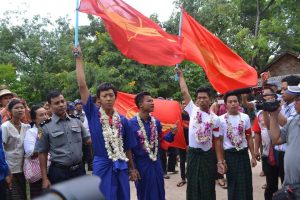The Myanmar government is tightening the screws on a nascent antiwar movement, with a student group claiming earlier this week that 14 protesters have been arrested for taking part in demonstrations against a fierce conflict in the western state of Rakhine.
According to the All Burma Federation of Student Unions (ABFSU), the arrests took place in Mandalay, the nation’s second-largest city, and several other cities in central Myanmar. It added that about 30 other students had gone into hiding to avoid arrest.
Earlier this month, students began holding small demonstrations and posted stickers on utility poles criticizing an ongoing conflict in Rakhine State in Myanmar’s west. Students across the country have also distributed leaflets calling for democratic reforms, containing slogans such as “dictatorship must fail” and “oppose murderous fascism.”
Since last year, northern Rakhine State has been ravaged by fighting between the Myanmar military and the insurgent Arakan Army, which has led to the death of around 300 civilians. The civil war has also displaced around 220,000 people from northern Rakhine and parts of neighboring Chin State.
This followed the military’s vicious assault on the Muslim Rohingya populations of northern Rakhine state, which, beginning in August 2017, drove more than 700,000 people across the border into Bangladesh. Students are also protesting an internet blackout imposed in Rakhine due to the ongoing conflict.
“We demanded that they stop the civil war because we want peace,” Swam Pyae Tun, a university student from the central city of Meiktila who went into hiding to avoid arrest, told Radio Free Asia earlier this week.
According to the ABFSU, an umbrella group which represents the interests of students across Myanmar, some of the arrested students have been charged with offenses carrying up to two years in jail. These include breaches of Myanmar’s Peaceful Assembly and Peaceful Procession Law, which requires organizers to give notice to the authorities 48 hours before holding a protest or assembly, and another ambiguous law that prohibits any speech that could “fear or alarm in the public” or lead others to “upset public tranquility.”
The organization Human Rights Watch puts the number of students that have been arrested or are facing charges at around 20.
The student arrests highlight once again certain striking continuities between the current administration of Aung San Suu Kyi, once revered as an icon of democratic principles in the West, and the bad old days of military rule in Myanmar. Since riding into office on a wave of popular support at national elections in 2015, Aung San Suu Kyi’s National League for Democracy (NLD) government has done little to scrub repressive laws from the books, many of them holdovers from British colonial days.
The government has permitted and presided over numerous spurious prosecutions of dissenters, political activists, and journalists and editors reporting on sensitive subjects. The highest profile case was that of Wa Lone and Kyaw Soe Oo, reporters for the Reuters news agency, who were arrested in December 2017 after investigating the killing of 10 Rohingya Muslim men and boys by security forces and Buddhist vigilantes during the military’s assaults in Rakhine State. The pair were convicted of violating Myanmar’s Official Secrets Act and sentenced to seven years in prison, before being released under a presidential amnesty in May 2019.

































